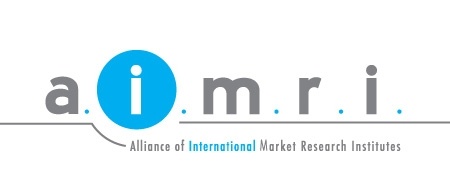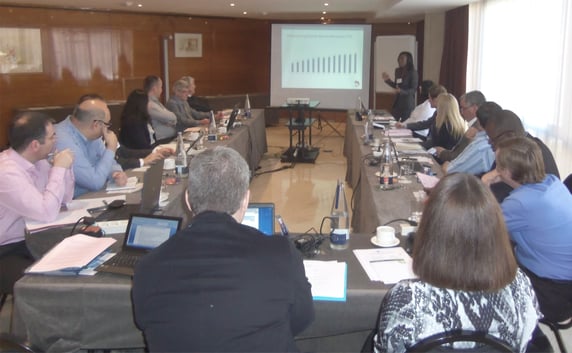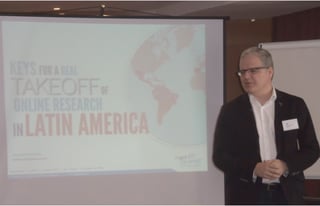AIMRI Conference, Barcelona: “Getting ahead in the battle for global growth”
Friday 8th March 2013
Starting the day with a distended coffee at 9:30 in the hotel NHCalderon situated in the heart of Barcelona, close to Catalunya’s Square. The delegates arriving and everything was ready to an interesting AIMRI meeting called “Getting ahead in the battle for global growth”.
Conference Chairman Michael Stanat, coming from the USA, welcomed the 20 delegates to the conference and introduced the first lecturer Marta Llobet. Llobet has a wide experience working for different market research companies such as TNS UK and Millward Brown, and is now working for Estudio Silvia Roca (ESR).
Her presentation was about the importance of “Taking the global view” and she focused it on the region of Latin America. Moreover, she added some interesting facts about countries in the region such as: Peru is one of the leading countries in the fishing industry, Colombia supplies 90% of the world production of emeralds, the first World Cup was win and hosted by Uruguay... And so, she said that we do not have to assume similarities in between those 19 countries that compose South America. Marta presented Mexico and Brazil as the two most relevant Latin America countries in the Market Research industry, detailing that they are in the 12th and 8th places of international research markets, respectively.
In addition, she explained some peculiarities about Mexico and Brazil. On one hand she said, Mexican people are very concerned about security and that’s why up to 70% of respondents fail when answering about personal information (post address or telephone number. Another relevant fact is about the cell phone penetration in the country, which is really high however it stills expensive. Apparently, only 17% of the total Mexican population are able to log on.
On the other hand, Brazilian people are optimistic, love to feel important and think high incentives are needed. With them only shorts surveys should be conducted (no more than 20 minutes long) and a researcher can easily get useful information and access to many different sectors of population.
Next presentation came from Catherine Delcin’s hand, who is Managing Director of Delcin Consulting Group headquartered in San Francisco. Catherine, explained the importance of Life Sciences sector which includes Pharma, Biotech and Med Device and added that last year Life Science firms spent 30% of their annual income on legal settlements. The main industry trend in this area is the rising demands for new drugs in Asia Pacific and Latin America, where there are emerging clusters. The research opportunities in this business area are: the geographical expansion, the topical growth such as oncology and HIV, the industry clusters (emerging VS mature markets) and the workforce development.
At last, but not least, Catherine extoled that we cannot forget that “the key industry player is the Navigant”. And she added a quote from the writer Stephen Covey which says “Management is efficiency in climbing the ladder of success: leadership determines whether the ladder is leaning against the right wall”.
The following lecturer was Michael Stanat, the Conference Chairman, who is Global Research Executive at SIS International Research (Asia Pacific) and an expert in China’s market as we can deduce from his authorship of the book called "China's Generation Y: Understanding the Future Leaders of the World's Next Superpower". Stanat started his speech, called “Global transformation: how research can meet the needs of a rising Asia”, with China’s most important facts and trends: the world’s 2nd largest economy, the emergence of the middle class, the reduced growth, the new emphasis on consumption, the growth of 18% in the luxury market… He emphasized the opportunity in China’s e-commerce as it is increasing thanks to the Internet penetration; it is the world’s biggest smartphone country, the social media is in right now and there exists a consumer loyalty.
However, there are still difficult challenges to go through in this Asia country. The economy is improving, but its evolution is slow. There are cultural and traditional norms which are real barriers for market researchers. And there exist many HR hurdles such as: intellectual property, ageing society, domestic competition…
In conclusion, China’s economy is in transition, with increased development. In the end, Michael cited a Chinese proverb “Be not afraid of growing slowly, be afraid only of standing still”.
Lecturer Joaquim Bretcha, Sales Director Europe at Netquest, came after Stanat. Bretcha started working in the mass consumer sector (Carrefour, Auchan and Aecoc) and later on he developed his professional career in market research companies such as TNS and Synovate. His presentation “Keys for a real takeoff for online research in LATAM”, was focused on the Latin America region and he introduced it saying that Brazil is this region, in terms of market research, equivalent to Italy in Europe, as the Portuguese speaking country has more than the 40% of the total amount of market research industry in the Latin countries. Mexico is equivalent to Sweeden, covering the 20% of the industry and Colombia to Turkey, which is in the 3rd position in the ranking followed by Argentina. Despite these positive facts, there is a huge challenge in this region which is: online market research. In order, Argentina (66,4%), Colombia (59,5%), Chile (58,6%) and Brazil (45,6%) are the top four countries in terms of Internet penetration in the last year. Internet is getting slowly to the region but online market research is not advancing simultaneously.
All of this leads to a kind of “the chicke or the egg causality dilemma”: no panel means no local demand, no local demand means no panel. Foreign online-experienced researchers are currently demanding online sample in Latin America but, without higher local demand, Latin American panels cannot deliver hard-to-reach targets. Bretcha then revealed the four things that could break the current dynamic: tackling the “social class” problem recruiting low social class population, mixing methodologies, invest in growing the panel to promote
demand later and taking advantage in the definitive takeoff of mobile Internet (solving at the same time the lower class access to internet).
His ending was to get to these different countries through local knowledge, because Latin America is a region but not as “uniform” as we think so a deep knowledge about the region is needed.
After Netquest exposition lecturers gathered in the hotel’s dining room to have lunch and exchange opinions about the industry.
At three o’clock they returned to the saloon to listen to Sola Akinnagbe, Group Managing Director at Market Research Consultancy Ltd. Lagos. The Nigeria’s expert started his speech joking about Africa and saying it was not a country. He added that the 7,8% of the world’s Internet users are African people, where the top Internet countries are: Nigeria (45% ), Egypt (21%) and Morocco (15,6%). Afterwards, Sola make his considerations about the Nigeria consumer: the 86% of Nigeria population (120,000,000 people) are in low social class, 60-65% are rural population and nearly 51% do not have daily access to TV.
All of these facts shape the habits and trends in the country, where shopping behavior is more concerned about volume than quality, and the consumers will search for acceptable quality at a reasonable price taking advice from the retailer. Nigerian people like to chat and gossip with neighbors, love to enjoy social gatherings and follow the recommendations of opinion leaders. They are very religious too and respect opinions of the religious leaders.
The major challenges in the African country are: cultural differences (religion, ethnicities, traditions, gender equalities and marriage…) diversity of languages (4 languages in South Aneruca, 7 in Zambia, 8 in Kenya…), infrastructural ways of communication, environmental hitches… The current situation though is that face-to-face (CATI) surveys have already started to take place, printing suvryes it too expensive and there are lots of difficulties in making surveys on phone due to a lack of lines.
Finishing with the last presentation called “Respondents are people too!” by the hand of Nik Harta Director at Opinion Matters coming from the UK. Nik began his presentation talking about the importance of the technology as it has allowed human to cross borders. Moreover, he said that we are now facing another culture change, as the technology brings to: saving time and money, more choices, broadcast our opinions… In the EU there is a 57% of smartphone penetration, which is increasing speedily.
As respondents we used to go to the market researchers, but now they come to us. Nowadays, respondents (consumers) have the power and that is why we ask for instant access, positive experience, customer service and instant engagement. In fact, we are creatures of habits as we always re-visit the same 5 or 6 websites and we are so “predictable” even when evolving.
Harta, added that as the phone companies puzzle over their future business model, pollsters are starting to wonder about their own ability to continue in a world without landlines. He also said it was so relevant to look for different ways to engage the audience through hobbies, sports, news, socializing and creating a tone and style to match your target audience. Nic Harta concluded his speech with a last consideration “Don't be afraid to innovate and try new things, ensure it works and hope the audience has enjoyed the experience, leave them a reason to return and say thank you”.
After this last session, lecturers could have a break followed by the open council meeting presented by John Mackay which headed to an open discussion. To end with, all the lecturers were invited to the gala dinner in a local restaurant in Barcelona enjoying the charming weather.








